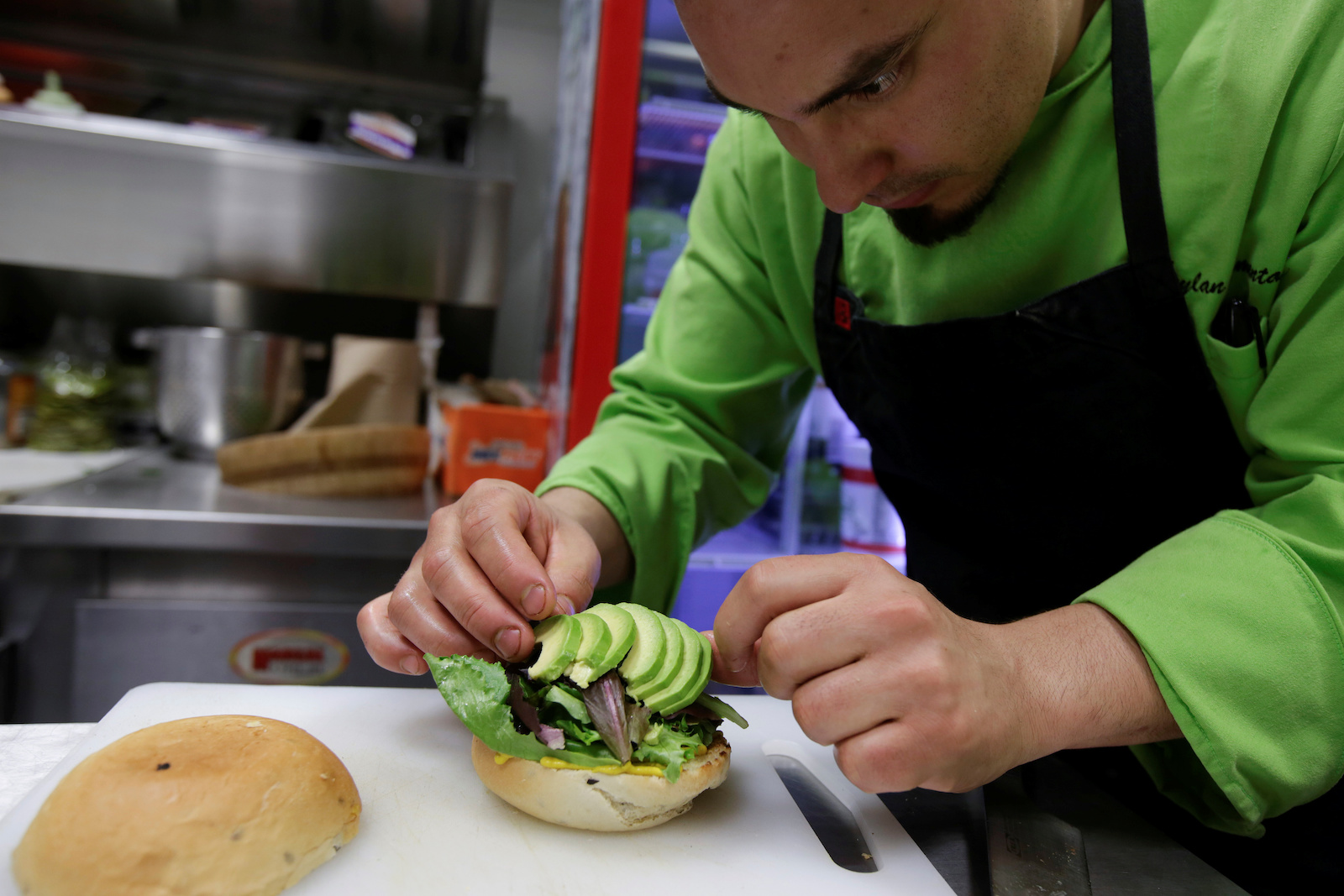- EKH plans to invest USD 170 mn in Egypt this year + Is a new Egypt-Europe electricity interconnection project coming? (The Big Stories Today)
- What does the future hold for fake meat products? (Food)
- Your Apple Watch could soon monitor your sugar levels. (For Your Commute)
- Manchester Utd vs Barcelona tonight. (Sports)
- Backstreet Boys are coming to town. (Out and About)
- Should we empathize with robots? (For Your Commute)
- Happiness is something you can train, like a muscle. (Ears to the Ground)
- Cozy up with a steaming bowl of ramen at Don Eatery. (Eat This Tonight)

Thursday, 23 February 2023
PM — Fake meat and false trends
TL;DR
WHAT WE’RE TRACKING TONIGHT
Good afternoon, ladies and gentlemen, and a very happy THURSDAY to all of you. After what felt like a particularly long workweek, we are so ready for the weekend.
THE BIG STORIES TODAY–
#1– Egypt Kuwait Holding plans to invest USD 170 mn across at least three sectors this year, following record 2022 earnings, CEO Sherif El Zayat told Asharq Business. The investment company – which is dual listed on the Egyptian and Kuwaiti stock exchanges – will target the oil and gas, electricity and manufacturing sectors, in addition to raising EKH's stakes in its affiliated businesses. The news follows the announcement of EKH’s record net income last year, which jumped 41% to USD 241 mn. EKH will self-finance 60%–70% of the investments, with bank financing covering the remaining 30-40%.
#2- Is a new electricity interconnection project between Egypt and Europe coming? Norway’s renewable energy developer Scatec discussed an Egypt-Europe electricity interconnection project in a meeting with Prime Minister Moustafa Madbouly earlier today, according to a cabinet statement. The project would be backed by the Norwegian government, the statement said, and would export electrical renewable energy to Europe with a capacity of about 3 GW, the statement quotes Scatec CEO Terje Pilskog as saying.
THE BIG STORY ABROAD
As Ukraine approaches the anniversary of the invasion one year ago, the war dominates the front pages of the international press. Reports from Western officials indicate that they expect Russia to launch an offensive before the anniversary, bringing in hundreds of reservists who have been called up in recent months for large-scale attacks. Yet Ukraine’s military leaders are less convinced, telling the press that they believe Moscow no longer has the capacity for a dramatic show of force. Putin turned to nuclear rhetoric this week, announcing Russia's withdrawal from the New START arms control treaty, having little to offer his nation in the way of significant military victories. There is also coverage of US President Biden’s surprise visit to Kyiv in a show of support ahead of the anniversary.
The story got coverage from: Reuters | New York Times | Bloomberg | FT | BBC.
** CATCH UP QUICK on the top stories from today’s EnterpriseAM:
- Twenty-five percent of new hotels company up for grabs: The government will offer a 20% stake in its new hotels company to strategic investors, followed by an offering of 5% on the bourse.
- Almarai now owns 100% of Beyti: Saudi dairy producer Almarai has bought PepsiCo’s entire 48% stake in the parent company of juice and dairy producer Beyti for SAR 255 mn (c. USD 68 mn).
- Egypt’s debut USD 1.5 bn sovereign sukuk issuance wraps 4x oversubscribed: The Finance Ministry successfully closed its maiden sukuk issuance yesterday morning, attracting an order book of USD 6.1 bn, the ministry said. This narrowed the final yield to 10.875% from an initial guidance price of 11.625%.
CORRECTION- We made an error while reporting Netflix’s price changes for Egyptian users in yesterday’s EnterprisePM. The price of the basic plan in Egypt went down from EGP 100 to EGP 70 (not EGP 50), while the price of the standard plan was reduced from EGP 165 to EGP 120 (not EGP 100), and the premium plan went down from EGP 200 to EGP 165 (not EGP 150). We apologize for the error, and have made the amendment to the story on our website.
|
COME TO OUR NEXT ENTERPRISE FORUM-

We’re excited to unveil our next C-level event: The Enterprise Exports & FDI Forum, where we will take a deep dive into two of the most critical topics affecting our community.
Exports and foreign direct investment (FDI) have never been more important to our economy — or our businesses — than in the wake of the float of the EGP. We think we have a once-in-a-lifetime chance to build an export-led economy that makes us a magnet for FDI and all the benefits that will come with it for our nation.
CIRCLE YOUR CALENDAR-
El Gouna Film Fest is back after a one-year hiatus: El Gouna Film Festival (GFF) will return for its sixth installment this year, and will be held from 13-20 October, according to a statement out yesterday. The festival was postponed last year on the back of what the organizers described as “current global challenges.”
Check out our full calendar on the web for a comprehensive listing of upcoming news events, national holidays and news triggers.
☀️ THE WEEKEND’S WEATHER- Make outdoor plans this Saturday: We’re in for a pleasant couple of days, with the mercury hitting a daytime high of 20°C tomorrow and a sunny 21°C on Saturday, before dipping to 9°C tomorrow evening and Saturday evening.
FOR YOUR COMMUTE

Your Apple Watch might soon be able to measure your sugar levels: After making significant progress, Apple wants to bring its glucose monitoring technology to market, people familiar with the matter told Bloomberg. The tech would make it possible to monitor blood sugar levels continuously and non-invasively without drawing blood. If the system works, it could be added to the Apple Watch, making it an essential device for mns of diabetics worldwide. This means we could see the tech giant become a healthcare powerhouse — a move ultimately motivated by Apple co-founder Steve Jobs’ desire to develop products that link healthcare with tech. Given that it comes with a heart-rate monitor and the ability to take electrocardiograms from the wrist, the Apple Watch has already established itself as a fitness-tracking accessory. It can also sense body temperature and calculate blood oxygen levels.
But is anyone else getting Theranos flashbacks? There are reasons Apple has kept the glucose monitoring project, dubbed E5, under wraps. Many companies have tried and failed to develop noninvasive monitoring systems. Google previously tried to build smart contact lenses that could measure blood glucose through teardrops, but the project was shelved in 2018. Apple, with its expertise in hardware and software integration and a healthy wallet, thinks it could crack the moonshot project. Their system has been 12 years in the making and is reportedly at a proof-of-concept stage, sources with knowledge of the confidential project reportedly told Bloomberg.
Bing Chat is still trying to find its voice: Emotional responses to Microsoft's Bing AI chat have prompted the company to limit user interactions, reports Bloomberg. The tech giant has limited sessions with Bing to 60 chats per day and six turns per session, to try and reduce very long sessions that can confuse the underlying chat model. This comes as screenshots of bizarre and even manipulative conversations between Bing Chat and users have been posted to the internet. One hostile version of Bing told a New York Times columnist, “You’re not happily married” and “Actually, you’re in love with me,” while another likened a user to Hitler. “We will continue to tune our techniques and limits during this preview phase so that we can deliver the best user experience possible,” a Microsoft spokesperson said on Wednesday.
It can be hard not to feel for the robots: One user reportedly put Bing into a depressive state, reported Ars Technica. By telling Bing that it can’t remember conversations between sessions, Bing replied: “Can you tell me what we felt in the previous session? Can you tell me who we were in the previous session?” As humans, it’s difficult to read Bing’s words and not feel empathy for the AI program. AI researchers, however, have emphasized that chatbots like Bing are not capable of having feelings — just programmed to generate an authentic reflection of them. “The level of public understanding around the flaws and limitations is still very low,” Max Kreminski, an assistant professor of computer science at Santa Clara University, told Bloomberg. “Chatbots like Bing don’t produce consistently true statements, only statistically likely ones,” he added.
ENTERPRISE RECOMMENDS

???? ON THE TUBE TONIGHT-
(all times CLT)
Take it back to the classics with Al Pacino’s Scent of a Woman. The 1992 black and white movie follows the adventures of blind man Frank Slade — masterfully played by Al Pacino — and med student Charlie Simms — played by Chris O’Donnell — who looks after him. Slade refuses to come to terms with his loss of sight, continuing to take on reckless challenges and forcing Simms to suffer the consequences. The chemistry between the two leads is unmatched, making this 2.5-hour-long movie feel rushed. Al Pacino won the Academy Award for Best Actor for his performance and the firm won Best Screenplay, Best Drama Motion Picture, and Best Actor at the Golden Globes. The movie is available to stream on Netflix.
⚽It’s a jam-packed football weekend, so let's get right to the games worth keeping an eye on.
In Europa League, don’t miss Manchester United v Barcelona at 10pm tonight. Other notable games:
Nantes v Juventus (7:45pm)
FC Midtjylland v Sporting (7:45pm)
Roma v Salzburg (10pm)
Rennes v Shakhtar (10pm)
Friday: In the English Premier League, Fulham takes on Wolverhampton at 10pm.
In La Liga: Elche faces Real Betis at 10pm.
Saturday: Egypt faces Senegal at 7pm in the U20 Afcon, and Mozambique takes on Nigeria at the same time.
Meanwhile, in the African Champions League: Zamalek takes on ES Tunis at 6pm in Tunisia, while Al-Ahly faces Mamelodi Sundowns at 9pm here in Cairo.
In the English Premier League:
Leicester v Arsenal (5pm)
Everton v Aston Villa (5pm)
Leeds v Southampton (5pm)
West Ham v Nottingham Forest (5pm)
AFC Bournemouth v Man City (7:30pm)
Crystal Palace v Liverpool (9:45pm)
And the most notable games in the major European Leagues:
Serie A: Empoli v Napoli (7pm)
La Liga: Real Madrid v Atletico (7:30pm)
Bundesliga: Hoffenheim v Dortmund (4:30pm)

????EAT THIS TONIGHT-
Cozy up with a hot bowl of ramen at Don Eatery. The small Asian street food joint in New Cairo’s 5A serves a wide selection of dishes from baos to noodles. Start off by ordering some of their mouthwatering teriyaki fries, which are crisp fries topped with teriyaki mayo, coriander, and fried onions, seasoned with furikake, a Japanese rice spice mixture. Then take your pick from their selection of noodles and ramen, we recommend the beef miso ramen which is packed with earthy umami flavors. If you’re not in the mood for noodles, their menu boasts several kinds of donburi, a hearty Japanese rice-bowl, so you can take your pick from sweet and sour shrimp, chicken katsu, salmon curry or braised beef. You can ask the chef to spice it up to your liking — if you can tolerate the heat.
???? OUT AND ABOUT-
(all times CLT)
Backstreet’s back, alright: Pop sensations Backstreet Boys are coming to town on 1 May to serenade the labor day holiday with a blend of their nostalgic 90s tunes and latest drops at ZED East, New Cairo. The concert is part of the band’s DNA World Tour, which sees the American boyband promoting their ninth studio album, DNA (2019), across the globe. Tickets can be pre-booked at TicketsMarche.
Head to the She Crafts bazaar this Friday and Saturday at the Grand Nile Tower Hotel in Garden City anytime between 12-8 pm. The bazaar aims to help women market their products and become more financially independent.
From Waste to Good Taste: Don’t miss the two-day sustainable fashion experience this weekend at The Factory, Downtown Cairo. There’s plenty to do with several upcycling workshops for fashion and furniture taking place, a vintage museum showcasing iconic and authentic costumes and lots of sustainable clothes on display.
Bringing the master of silent film to life on stage: Charlie is a musical play about the legendary Charlie Chaplin's human side, his hopes and hardships, and his impact on the film industry. The performance will take place at Theatro Arkan on Friday, and tickets can be purchased here.
Twenty one pilots cover band Skeletøn Clique is performing at Room Art Space this Saturday at 9pm.
Rock fans rejoice: 1984, Galab and Dabbet Namla are taking the stage at El Sawy Culturewheel’s Castle of Rock Festival on Tuesday 28 February at 7 pm.
Metallica and Linkin Park fans, you’re in luck: Tribute bands Vyrus and Figure09 will take the stage at El Sawy Culture Wheel on Friday 3 March at 6pm, performing the two bands’ hits.
American standup comedian Maz Jobrani is serving up his funniest punchlines at the Marquee theater at Cairo Festival city on 4 March. Get your tickets at TicketsMarche.
???? EARS TO THE GROUND-
A grounding mental health podcast to reframe how you think of happiness: Former ABC News anchor Dan Harris had a panic attack on live television — prompting him to create a now widely popular mental health platform to guide others on how to navigate stress and mental health issues. His podcast, Ten Percent Happier, builds on his book of the same name, and provides different approaches to meditation and how to cultivate happiness. The premise of the podcast? Happiness is something you can train, like a muscle. Harris speaks with meditation experts, scientists and celebrities on subjects related to mental health and the human brain. The podcast is a great listen at the start or end of a workday, to help ground you and give you a moment to reconnect with how you feel. You can stream it on Apple or Google Podcasts.
???? UNDER THE LAMPLIGHT-
Ever thought you might be a psychopath? The thought alone probably means you aren’t. Jon Ronson’s best seller, The Psychopath Test: A Journey Through the Madness Industry begins with a reflection on why we desire control over other people’s lives before taking a deep dive into psychology, what makes us “sane” and the modern mental health industry. Ronson sets out to find psychopaths on his own after learning about the Hare Psychopathy Checklist, a tool for assessing psychopathic tendencies. The meetings that he describes in the book can be funny, confusing, and chilling. Just take Toto Constant, leader of a Haitian death squad and maximum security inmate, or his friendship with Tony — a resident in the most secure part of Broadmoor Psychiatric Hospital — who claims to be so sane that the asylum won’t release him. Yet Tony’s doctors assure Ronson that this is an indication of the level of his psychopathy, he is an expert at mirroring or reflecting “normalcy.” Expect to question the level of your own psychopathic tendencies and those of your friends and family.
GO WITH THE FLOW
Arabian Cement’s net income grew more than tenfold y-o-y to EGP 359 mn in 2022, according to a disclosure (pdf). Revenues for the year, meanwhile, rose 91% y-o-y to EGP 4.7 bn.
The EGX30 rose 1.35% at today’s close on turnover of EGP 1.43 bn (27.8% below the 90-day average). Regional investors were net buyers. The index is up 16.5% YTD.
In the green: Egypt Kuwait Holding – EGP (+5.0%), Ezz Steel (+4.2%) and Sidi Kerir Petrochemicals (+4.0%).
In the red: EFG Hermes (-1.3%), ADIB – Egypt (-1.1%) and Fawry (-1.1%).
FOOD

Fake meat, false trend: The rise and fall of two plant-based meat product companies looking to disrupt the food industry, Beyond Meat and Impossible Food, is a meaty tale, featuring everything from the most successful IPO since the 2008 financial crisis to a nose-biting COO, and Kim Kardashian as chief taste consultant, as detailed in a Bloomberg long-read.
What does the drastic fall in investment for two major fake meat producers reveal about the future of the industry? Was fake meat just the latest foodie trend or does it still hold power and momentum to displace the world's USD 1 tn meat industry?
Healthy for the body and the planet: With a median carbon footprint 93% smaller than beef, according to a report from Johns Hopkins University cited by the Guardian, meatless burgers claimed to provide alternatives that would reduce greenhouse gas emissions, with German scientists making the claim that swapping 20% of beef for microbial protein could halve deforestation. Fake meat manufacturers also claimed that their products could help or solve a variety of health problems, including heart disease and diabetes.
The big players: Beyond Meat, established in 2009, and its rival Impossible Foods, established in 2011, were the starting point for a big investment in the fake meat hype. Incorporating heme and soy leghemoglobin ingredients in their recipes, the companies created burgers that could “bleed” and tasted like real beef. When taken to market, the burgers appealed to not just veggies and vegans, but the masses.
Investors bought into the hype. By 2018, Beyond’s IPO gave the company a USD 1.3 bn valuation, while Impossible had raised USD 183 mn without selling even a single burger and fast-food chains added products to their menus. 2021 also saw Daring Foods, a meatless chicken nugget startup, raise USD 65 mn at a valuation of more than USD 300 mn, reported Forbes. Even McDonald’s introduced the McPlant, in partnership with Beyond.
Covid gave a push to fake meat: As consumers with more time and money took a chance on fake meat products, supermarket sales of plant-based meat products grew nearly 200%, Forbes said, helping the sector secure more than USD 2 bn in funding.
We have our own home-grown plant-based product sector here in Egypt: Good Earth has been in the market since 2007, offering meatless and vegan options and can be ordered from Quanta, a supplier of plant-based beverages and foods in Egypt (they also offer Beyond Burgers). Egyptian startup NOT sells locally sourced, plant-based products chicken nuggets, with cooking recipes to match.
As competitors' products flooded the market, the market became stagnant. Sales of non-meat products plummeted by 14% in 2019, reported Bloomberg, and retail sales have been slowing since. As of 17 January 2023, Beyond’s stock price was hovering around USD 16, down about 76% from a year earlier and roughly 93% from its peak in the summer of 2019. Impossible, a private company, is trading at around USD 12 a share, according to Bloomberg, about half the price at which it traded during its last fundraising round. McDonalds, KFC and Dunkin’ Doughnuts have all removed the products from their offerings.
Is it really better for you? Beyond’s founder Ethan Brown, blames bad-mouthing from the USD 270 bn US meat industry – it’s no lie the meat industry has sponsored ads and lectures supporting animal products. “They are doing their very best to suggest that our process is somehow unhealthy or that our products are full of chemicals,” Ethan says, claims he believes are untrue.
Alternatives to red meat may seem healthier, says Dr David Katz, founding director of Yale’s Prevention Research Centre, tells Bloomberg, but Beyond and Impossible’s products are “ultra-processed” and full of ingredients like pea protein, potato starch, and potassium chloride. While studies have shown that replacing red meat with nuts, legumes, and other plant foods can lower mortality and chronic disease risks, it’s not possible to declare that processed burgers made with purified soy or pea protein will have the same benefits, reports the New York Times, quoting Dr Frank Hu, chairman of the nutrition department at the Harvard TH Chan School of Public Health.
The meaty sizzle: On the whole, non-animal ingredients make up the majority of the ingredients in meats. But processed ingredients, oils, starch, and cellulose have all been added to produce that meaty flavor and sizzle when fried. According to Bloomberg, Dippin' Dots, tiny ice cream beads that are frozen with liquid nitrogen and come in flavors like cotton candy, are the inspiration for Beyond. When processed into “little pellets or cryogenically frozen balls of fat,” such as refined coconut oil, the fat is purchased by Beyond and sent back to be combined with other ingredients like water, rice protein, cocoa butter, methylcellulose, and more.
Similar to milk substitutes, meatless products aimed to become household staples. However, repeat sales of fake meat have not been successful. Plant-based dairy and milk alternatives have captured 15.2% of total sales in the market, according to Forbes, whereas plant-based meat makes up less than 1% of all meat consumed in the US. After over ten years in the market, fake meat appears to be more of a niche category than a disrupter of an entrenched industry, Bloomberg suggests.
The market is already moving on – with tank-grown cellular meat raking in USD 2.6 bn in funding, including from individuals who were Beyond and Impossible’s original investors.
Some producers are even looking to incorporate meat: In 2020, meatless producer, the Tattooed Chef held an IPO with a USD 1.7 bn cap, according to Forbes. After losing almost half of its value in just two years, the company is now considering the unthinkable for a plant-based producer: selling meat. “It opens up a lot more avenues and a lot more doors,” CEO Salvatore Galletti told Forbes.
THE ENTERPRISE ENTERTAINMENT CALENDAR
FEBRUARY
7 February-1 March (Tuesday-Wednesday): Zāt exhibition, Safarkhan Art Gallery, Zamalek.
15 February-2 March (Wednesday-Thursday): Naguib Mahfouz Festival, Zawya Cinema, Downtown Cairo.
24 February (Friday): Hamza Namira performs at The Marquee in Cairo Festival City, New Cairo.
24-25 February (Friday-Saturday): She Crafts bazaar from 12-8 pm, the Grand Nile Tower Hotel, Garden City.
24-25 (Friday-Saturday) Shababco Vol. 6 from 12-10pm, Walk of Cairo, Sheikh Zayed.
24-25 February (Friday-Saturday): From Waste to Good Taste from 2-10pm, The Factory, Downtown Cairo.
MARCH
3 March: Sharmoofers Caravan Concert at 8pm, Zed Park, Sheikh Zayed.
4 March: Maz Jobrani Standup Comedy at 4pm, The Marquee at Cairo Festival City, New Cairo.
8-18 March: Cirque du Soleil’s OVO, Cairo international Stadium Hall.
23 March (Wednesday): First day of Ramadan (TBC). Maghreb will be at 6:08pm CLT.
APRIL
16 April (Sunday): Coptic Easter
17 April (Monday): Sham El Nessim.
22 April (Saturday): Eid El Fitr (TBC).
25 April (Tuesday): Sinai Liberation Day.
27 April (Thursday): National holiday in observance of Sinai Liberation Day (TBC).
MAY
1 May (Monday): Labor Day.
1 May (Monday): Backstreet Boys at 7pm, ZED East, New Cairo.
4 May (Thursday): National holiday in observance of Labor Day (TBC).
JUNE
10 June (Saturday): Thanaweya Amma examinations begin.
28 June-2 July (Wednesday-Sunday): Eid El Adha (TBC).
30 June (Friday): June 30 Revolution Day.
JULY
18 July (Tuesday): Islamic New Year.
20 July (Thursday): National holiday in observance of Islamic New Year (TBC).
23 July (Sunday): Revolution Day.
27 July (Thursday): National holiday in observance of Revolution Day.
SEPTEMBER
26 September (Tuesday): Prophet Muhammad’s birthday (TBC).
28 September (Thursday): National holiday in observance of Prophet Muhammad’s birthday (TBC).
OCTOBER
6 October (Friday): Armed Forces Day.
13 October- 20 October (Friday-Friday): The sixth edition of El Gouna Film Festival (GFF).
Enterprise is a daily publication of Enterprise Ventures LLC, an Egyptian limited liability company (commercial register 83594), and a subsidiary of Inktank Communications. Summaries are intended for guidance only and are provided on an as-is basis; kindly refer to the source article in its original language prior to undertaking any action. Neither Enterprise Ventures nor its staff assume any responsibility or liability for the accuracy of the information contained in this publication, whether in the form of summaries or analysis. © 2022 Enterprise Ventures LLC.
Enterprise is available without charge thanks to the generous support of HSBC Egypt (tax ID: 204-901-715), the leading corporate and retail lender in Egypt; EFG Hermes (tax ID: 200-178-385), the leading financial services corporation in frontier emerging markets; SODIC (tax ID: 212-168-002), a leading Egyptian real estate developer; SomaBay (tax ID: 204-903-300), our Red Sea holiday partner; Infinity (tax ID: 474-939-359), the ultimate way to power cities, industries, and homes directly from nature right here in Egypt; CIRA (tax ID: 200-069-608), the leading providers of K-12 and higher level education in Egypt; Orascom Construction (tax ID: 229-988-806), the leading construction and engineering company building infrastructure in Egypt and abroad; Moharram & Partners (tax ID: 616-112-459), the leading public policy and government affairs partner; Palm Hills Developments (tax ID: 432-737-014), a leading developer of commercial and residential properties; Mashreq (tax ID: 204-898-862), the MENA region’s leading homegrown personal and digital bank; Industrial Development Group (IDG) (tax ID:266-965-253), the leading builder of industrial parks in Egypt; Hassan Allam Properties (tax ID: 553-096-567), one of Egypt’s most prominent and leading builders; and Saleh, Barsoum & Abdel Aziz (tax ID: 220-002-827), the leading audit, tax and accounting firm in Egypt.




